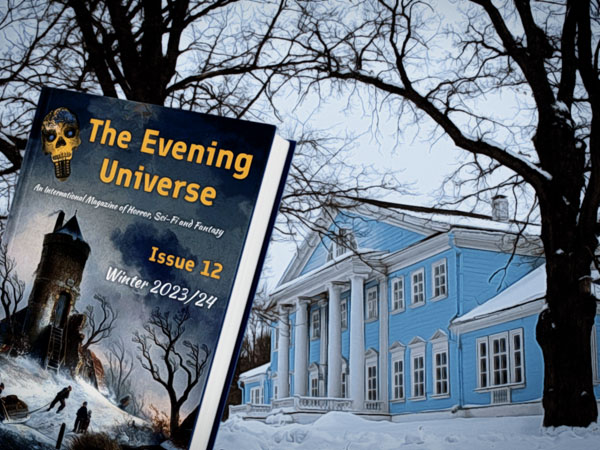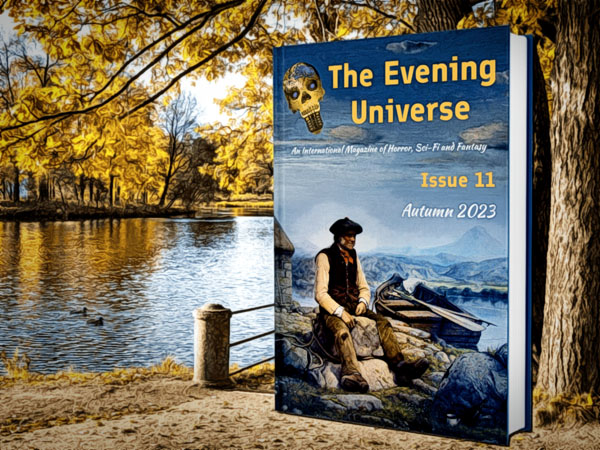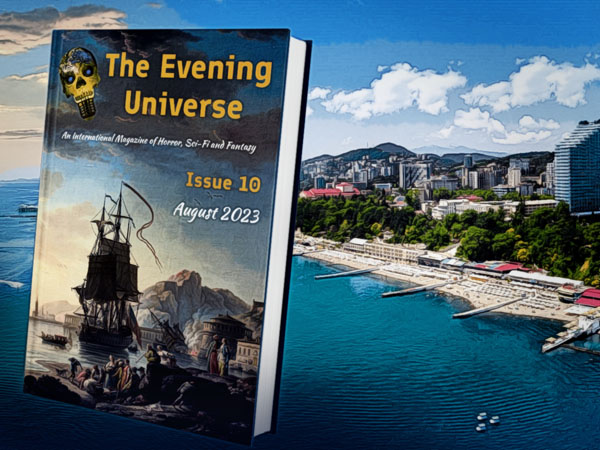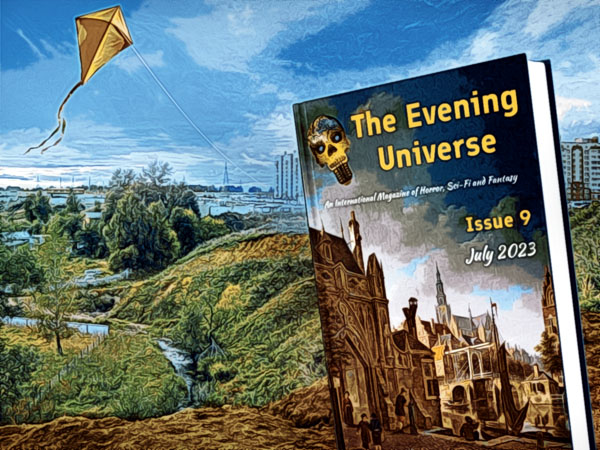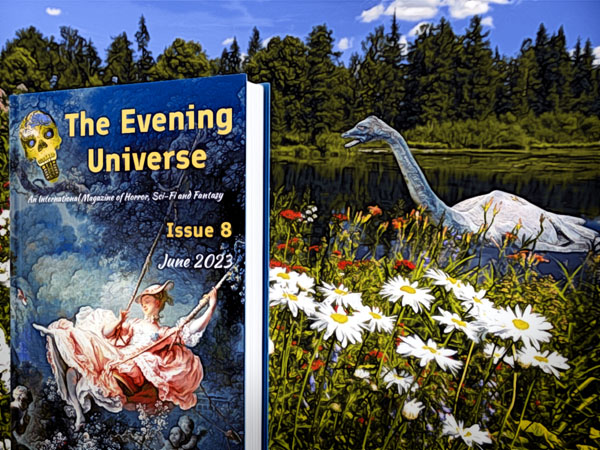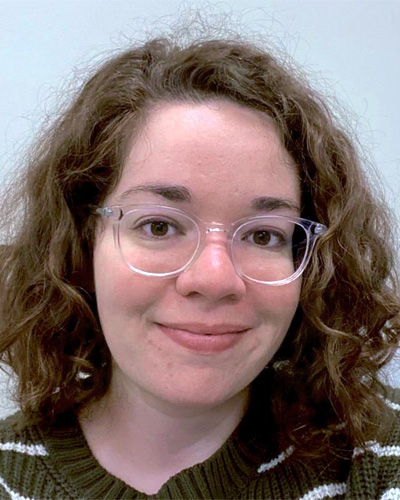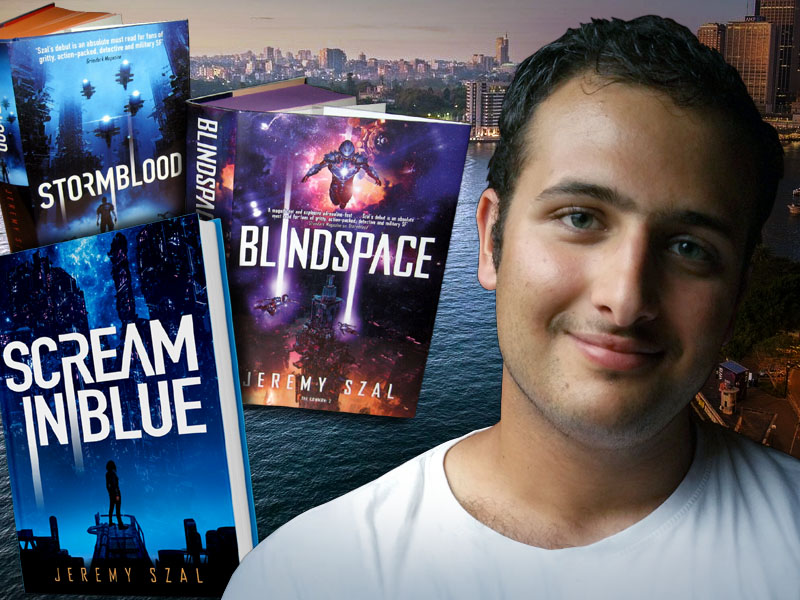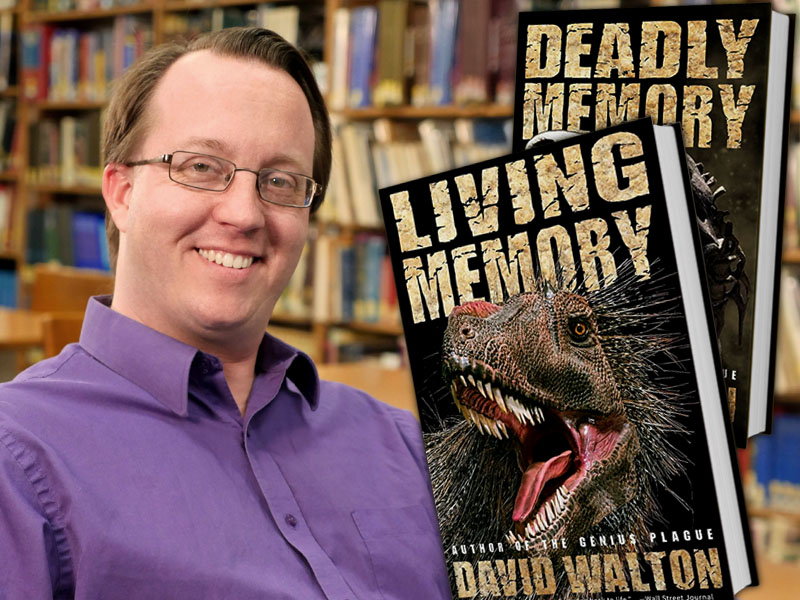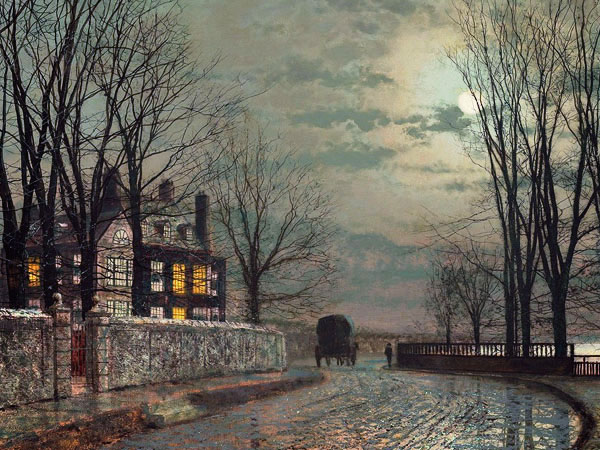
John Atkinson Grimshaw, “The Turn of the Road” (a fragment, 1883)
Selena had been the first to leave him, the only one the darkness had let escape from the house unscathed. He’d loved her. He’d loved them all, in one way or another, but Selena had been his only hope. He’d felt it, the darkness taming, fading—then snapping back into existence at the fear on her face.
She hadn’t agreed with his deal, his alliance. He’d tried to explain it, justify his choice, as much of a choice as it was. She’d told him that kind of power only corrupted, twisted—that it was only hunger, the desire for more and more. And it had made him into a monster.
“I hate it,” he admitted. It had been a struggle to keep it at bay, when she confronted him. “I’m sorry. I love you.” He couldn’t hold it long. “Run.”
Selena, her hand outreached, her face open and scared: it was the last time he saw her in person. She had been crying as she fled. Gone with her was his hope of ever being good again.
Every day since, he waited for her to come back, caught in the endless cycle of trap, play, consume, regret. It was unbearable, the weight. He’d stopped counting, knowing the number was too high to fathom after the first, but he remembered all of them.
The shadows grew long across the carpet, masking the wine stain from earlier. The conversation was long incoming, dreaded, inevitable. It had come to a head, now, delaying dinner.
“Jonathan, are you even listening to me?”
His eyes stayed on the shadow, biding time. He knew the stain was somewhere. He was the one who caused it, but he’d lost track of it in the darkness.
“Jonathan, seriously?”
He looked over his shoulder at her. “What?” The word rasped from his throat, and he tilted his head, half hiding under his fringe, making himself smaller. He was already seated on a footstool, trying to minimize his presence. He did that a lot now: oversized shirts, baggy pants, dirty blond hair that was a little too long.
Delia crossed her arms, unamused. Jonathan rolled his eyes, hoping that she couldn’t see him do so, and then he turned back to the invisible stain. It was the same story all over again. He was getting impatient, the guilt crawling up his throat.
“I can’t explain it. It’s just part of… Me. Whatever I am.” The honesty burned his mouth. This was the pivot point. She hadn’t bought that it was a nightmare, or something she’d made up.
“You lied to me, Jonathan. That’s where I’m at. You’re some—some thing and we’ve been an us for weeks, and yet I don’t even know who you are. What you are.”
“I’m still me, I think. I’m still Jonathan.” He sighed, resigned. He knew how the evening would go. “When I woke up, back when it happened, I was Jonathan, I remembered everything about me. Just that there was more of me. More of…I don’t know how to describe it, but more inside of me.”
Delia crossed the room and perched on the edge of the couch, as far away as she could get while still in the room. She pouted, visibly trembling. Half of her face was lit from the street lamps outside. Her eyes were cast down. Maybe she was looking for the stain too, searching for the point of impact.
“You’re a nice guy and all, but I just… How does it all work? How do you have all of that in you?”
Jonathan shrugged, wishing he had more to drink. He’d wasted the wine, then rapidly drank his refill, wondering how Delia’s reaction would measure against the rest. He put the glass down on the coffee table. It was past its usefulness. “I don’t know. It’s just been like this, this… shadow, like a shambling reach of darkness inside of me. Sometimes it just explodes outward, but I’m still me. I’m still this body.”
“But you’re not, are you? It was terrifying.” Delia’s voice shook. “I’m not sure why I’m still here but… I know what I saw. What I felt. I have to have answers.”
He was frightened that she was going to leave, really leave, too quickly. He couldn’t have that. It wouldn’t allow it. “Do you know the mark on my back? The red one?” he rushed to explain. There was still hope.
“You said it was a birthmark.”
“It is. Just more of a rebirth mark. I noticed it a few weeks after…” He was dredging up memories he’d long tried to forget. “I think that’s where whatever it was entered me, or maybe left me. Unleashed something inside of me regardless. It feels like,” his hand went to his chest, “it feels like pressure right here.” There it was—a flash of compassion in her eyes. He kept on with it. “It doesn’t feel wrong, per se. More like a presence. A weight. Like I know it’s there.”
“You say it—is it not you? Like, are you possessed?”
“I wouldn’t go so far.” Jonathan flashed a smile, hoping only after that his teeth didn’t quite show in the light. “Whatever it is, it is me, too.” He didn’t lie to Delia. He was still Jonathan, deep down. Whatever it was that did this to him didn’t change that. Not much, anyway. It just made the feeling more tangible. More dangerous.
He’d categorize it as hunger.
“What I saw earlier, what I felt, wasn’t you, Jonathan. Whatever that was—” she trailed off, shuddered.
But she wasn’t gone yet. Hadn’t fled. He knew exactly what she’d seen last night—had examined that form in the mirror for hours, days. A great hulking mass of nothingness, taller than anyone, drawing everything in the room toward him without moving a finger. He was gravity, the absence of light and presence of so many other things.
“It was me.” He tried to lighten the tone. He didn’t want to scare her off now, not when he had a sliver of a chance that she wouldn’t run. “I’m sorry you saw me like that.” She’d been in the bedroom, taking off her jewelry when it happened. He had walked by from the kitchen. She’d caught sight of his form in the mirror just over the dresser—made that delicious little gasp he’d grown familiar with over the years.
The only thing he had to compare the feeling with was grief. The weight in his chest, sucking inward, heavy but light at the same time: every time it felt like being left again. It was pressure, making him ache just under his ribs. He couldn’t reach it with heat, with cold. It settled when he placed his hand there, just so. Only the feeling of his own hand pushing in calmed the feeling that his chest would burst open with no warning.
The darkness settled like nausea below his lungs, and he felt himself smooth one hand up to settle it as he talked to Delia. He wouldn’t be able to hold it off forever.
“I just don’t feel comfortable staying here tonight.” Delia’s voice was apologetic, nervous of his reaction.
A tight smile drew across his face and he rose from his seat, arms spread wide, going for placating. “Delia, be reasonable—”
The image before her was the same as always: an unassuming man who needed a haircut, a worried tilt to his brow, a slight, innocent lisp when he spoke.
“I am, and I’m sorry.” She looked down at her hands, twisting them in her lap.
He took a step closer. His arms went out a little further, then beyond what he could normally reach. He was there, too. “Delia.” His back burned, a good burn. One of relief, of a tragic ending long since foretold, a prophecy reaching fulfillment. “You can’t leave, not now.” It was too late.
The shadows sucked the light out of the room, dimming the bulbs to weak gray light. For a second it would look like angel wings, then it was everywhere—Jonathan was everywhere. There wasn’t a noise, no wrenching tears or sounds of ripping flesh that one would’ve assumed: only a burning heat in the middle of his back, fire on skin.
All of Jonathan emerged, dampening the shadows with absolute dark. He was everywhere in the room, sensing more than seeing her, feeling the vibrations as she screamed. It was inevitable, the darkness. It spreads in him, always bursting to get out.
And Delia was gone.
It had started with Selena, the hope. She’d been one of the first.
They’d run into each other at the grocery store, the harsh lighting of the produce section doing neither of them any favors. They both reached for the same thing, then started a conversation about nothing.
“I never do this,” she had said, “but, would you like to go out with me sometime?”
Jonathan had choked on nothing, awkward and caught off guard, but had quickly agreed. He’d never thought such a beautiful woman would ask him, him of all people. He’d learn later it likely wasn’t him at all.
Selena was beautiful in an easy, make-believe way. She laughed and it filled the room, she sighed and Jonathan was captivated. He was smitten immediately, practically waiting on her hand and foot, leaning into the pathetic. He wined and dined her, romanced her, took her wherever she wanted which was often to art museums and public parks. He felt like it could be the answer to it all when she was still there weeks in, still interested, still alive. She could be the one who broke the curse and freed him.
He never should have put that burden on her.
Paying the piper. Selling your soul to the devil. Whatever you wanted to call it. Jonathan had turned over every cliché in his head for as long as he’d been stuck with the consequences.
He sold his life to the darkness in exchange for power and now had a burden to live with. He was bound to this life, his days and nights cyclical like the moon. Bring a woman in, wait for the darkness to want her. It liked to play with its food. Wait for a reprieve, for any sign of the end. Wait for someone to love him anyway.
He was like a grotesque in his own home, ornamental and sinister. He wasn’t beautiful or alluring—no. The thing inside him did the attracting, acting as a thrall. He was just the vessel, the hapless idiot bent on hoping someone, someday, wouldn’t be so repelled.
Maybe this was hell. It hadn’t been the first time he’d thought of it. This could be punishment for his sins in life, a never-ending tantalus of dangling everything he’d ever wanted just in front of him only to have it snatched away over and over. Maybe it was a devil torturing him; maybe he was becoming the devil.
Thing was, he felt the hunger too. The dreaded turn from blameless victim into creature of death used to catch him off guard. By Delia’s time, he’d come to expect it. Crave it, crave the moment the darkness took hold and he didn’t have to pretend any longer. He could just let go, let it happen. Reap the consequences another time.
Selena was an artist, a painter. She liked to take her supplies and go into nature to paint landscapes and the people enjoying them. She even painted Jonathan as he sat facing away from her at his desk, typing nonsense. He had that painting still, up in the attic. He kept it there with her others—the ones of his two storey Victorian house in the fall, of the backyard’s sole oak tree in winter, and of her own face, all leaning against an unfinished wall.
The latter was only half finished, the outline of her left ear and below her shoulders only a suggestion. Most of her face came alive through the canvas, smiling soft and patient and beautiful. Jonathan found himself drawn to it, over and over, sitting in the attic like it was his only escape from what lurked inside of him.
The self-portrait had become the centerpiece to a shrine of sorts. He had trinkets placed around it, small things the others had left behind. He went up there after Delia was gone, feeling horrifically full, disgustingly satisfied, with the offering of her pearl earrings. He’d found them on the dresser, the same place she’d left them after seeing him. He placed them next to a stray button and a hairbrush: tokens of Cynthia and Jenny.
The adrenaline and horror of the night raged inside of him, making him feel sick even with nothing physically in his stomach to come up. He stared at the portrait of Selena, the mementoes-turned-trophies surrounding it, like it would grant him absolution or offer him a way out. He would take anything.
“Delia was a nice girl,” he said as his eyes followed the curve of Selena’s dark hair on the canvas. “She was a bank teller, new to the area. Unconnected like the rest, like you. You know the story. I met her on a train, just like Tasha.” He sighed. He hated this, but it was what the darkness wanted. A beautiful woman, a seductive dance, a steady lure into false safety. Then a dramatic end. There wasn’t any other way forward. Jonathan just tried to make it all as painless as possible, choosing people with no family, no close connections.
“She wanted to adopt a dog soon. We were supposed to go to the pound this weekend.” A deep wave of melancholy drew up inside him, but he knew he wouldn’t cry.
You could stop it, the portrait seemed to reply. You know you could end it all.
His eyes trailed over the assortment of items in front of him, some dusty and others odd. Gina had only left a used tissue behind. Samantha left a book. One Ashley had left behind her entire purse, and the other Ashley a scarf. These things couldn’t be thrown away—he’d tried with the tissue—but something kept them in the house. An energy, or a memory, all sat next to one another in a macabre collection of souls.
He couldn’t bring himself to pass the darkness to someone else. He didn’t want to die, not with Selena still out there, somewhere. He stared into her painted eyes, replaying their life together before everything turned wrong. Someday, he promised her, promised himself. Someday I’ll convince you to come back.
Jonathan woke, curled up before Selena’s static gaze. His body ached, as it always did. His head pounded, just like normal. His back burned. It always did.
Jonathan had wanted things in his life, before. Beautiful things, expensive things. An extravagant house and a long designer coat and a car bought to impress. A beautiful, impossibly unattainable woman on his arm. No one would look down on him ever again. All of that, then his life would be worth living. All of that, all out of reach.
He had been stuck in a dead-end job, passed over for promotion year after year. His savings account was bleak, his prospects few. No other offers came through and no one wanted him. He had resented his lot in life.
Then he’d met a man who promised him everything he’d ever wanted outside of a bar one night, and he’d shaken the man’s hand in an alleyway. The next thing he knew was waking up in this house with a painful weight in his chest, the man gone, and a starving darkness within himself.
He avoided eye contact with the painted pupils and got up, wincing as his knees cracked. He could feel the house below was empty, that it would remain so. A late spring sun pushed blinding light through the octagonal attic window. There were still blooms on the lilies in the back garden, the bulbs planted there by some previous occupant. The juxtaposition startled him.
He used to tend to them, before. Pulling weeds, separating clustered bulbs—the expected work of each spring. The garden had gone wild in the years since. The weeds choking out the flowers, vines working from the ground to tear down old fencing. It would take the work of weeks to clear it out, set it to rights, and he had an urge to start immediately. The feeling of dirt under his fingernails, sweat on his brow… maybe it would help. But he had other responsibilities.
Instead, he went back downstairs, methodic in his folding of the attic ladder, the smack of it retracting to hide his secrets. He passed the guest room door, the bathroom, the office. He was down the stairs in a practiced flash and went straight to the cupboard and took out cleaning supplies. He followed his guilt into the living room, eyes tracking the floor until he found the stain. Wine. Red wine he didn’t get to relish, that he spilled when Delia had screamed.
He sprayed and scrubbed, watching white foam turn pink and dissipate. He dabbed it dry, repeated the process. The outline remained, marring the patterned rug.
Eventually, he got to his feet and put the cleaning supplies away, then moved the coffee table a little off-center to cover the stain. He lingered over the piece of furniture, then twitched and almost fell as if nudged from behind. It was time to move on to the next.

